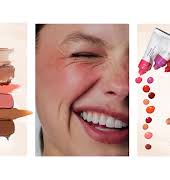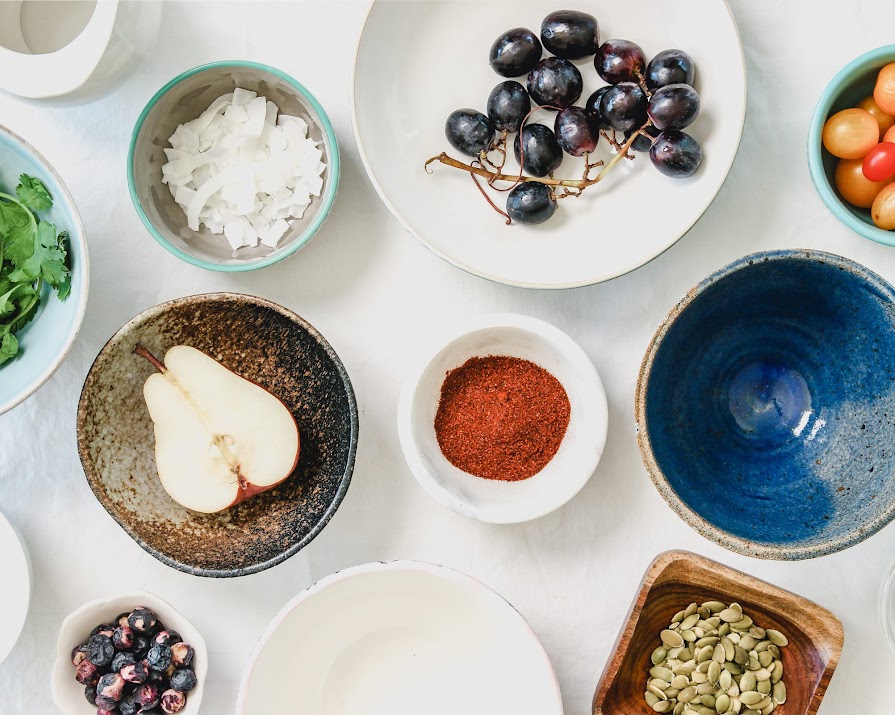
From antioxidants to zinc; here’s the alphabet of what you need to feel happy inside (and glow on the outside)
By Niamh ODonoghue
07th Nov 2020
07th Nov 2020
The world feels a little off balance right now, but you don’t have to.
We have more information and knowledge about health and wellbeing at our disposal than ever, but good health is about so much more than getting your eight hours and five-a-day. This is why Niamh O’Donoghue, with the help of qualified nutritional therapist Melanie Morris, created the IMAGE Wellness Alphabet so you can start feeling good from within and can get the most out of life. From Antioxidants to zinc, we’ll explain what you need to feel happy inside and glow on the outside.
 ANTIOXIDANTS have various beneficial roles in the body. They keep cells strong and healthy, protecting them from environmental damage; they can help slow ageing; and antioxidants play an essential part in the detoxification process in the liver, helping it convert harmful substances to easier to process metabolites. The key antioxidant vitamins are A, C and E.
ANTIOXIDANTS have various beneficial roles in the body. They keep cells strong and healthy, protecting them from environmental damage; they can help slow ageing; and antioxidants play an essential part in the detoxification process in the liver, helping it convert harmful substances to easier to process metabolites. The key antioxidant vitamins are A, C and E.
 BACTERIA: PROBIOTICS Human bodies contain trillions of microorganisms (bacteria), which live in our gut. A significant number of these bacteria, called probiotics, have a positive effect on our health; assisting with food digestion, keeping inflammation and disease at bay, and even contributing towards our overall feelings of good mood. Probiotics also line and protect the gut from negative invaders such as yeasts, fungi, and viruses. Modern science is putting more and more emphasis on the importance of good gut health and how we must continually boost our natural levels of probiotics by ensuring they are regulars in our diet. One of the best naturally occurring sources is live-cultured yogurt, as well as the fermented tea kombucha, sauerkraut, kimchi, and pickles.
BACTERIA: PROBIOTICS Human bodies contain trillions of microorganisms (bacteria), which live in our gut. A significant number of these bacteria, called probiotics, have a positive effect on our health; assisting with food digestion, keeping inflammation and disease at bay, and even contributing towards our overall feelings of good mood. Probiotics also line and protect the gut from negative invaders such as yeasts, fungi, and viruses. Modern science is putting more and more emphasis on the importance of good gut health and how we must continually boost our natural levels of probiotics by ensuring they are regulars in our diet. One of the best naturally occurring sources is live-cultured yogurt, as well as the fermented tea kombucha, sauerkraut, kimchi, and pickles.
 WOMEN NEED CALCIUM, not just for bone health, but also to protect the heart, muscles, and nerves. To increase your calcium levels, try increasing your dairy intake, eat more fish containing bones – like anchovies or sardines – and leafy greens. It’s important to note that in order for our bodies to absorb calcium efficiently, we must be sure of good vitamin D levels.
WOMEN NEED CALCIUM, not just for bone health, but also to protect the heart, muscles, and nerves. To increase your calcium levels, try increasing your dairy intake, eat more fish containing bones – like anchovies or sardines – and leafy greens. It’s important to note that in order for our bodies to absorb calcium efficiently, we must be sure of good vitamin D levels.
 DETOXIFICATION While there is an abundance of ‘detoxifying? treatments in salons, spas, and pharmacies, in actuality, it’s impossible to totally rid your body of all toxins, because we’re exposed to, and make toxins all the time. Detoxification is the liver’s job, and it does so by converting fat-soluble molecules into easier to metabolise water-soluble?ones through a series of processes involving proteins, antioxidants, and enzymes. Give your liver some help with the process by eating plenty of beetroots, turmeric and sea vegetables (the nori around sushi is excellent) and drink plenty of water to flush out toxins.
DETOXIFICATION While there is an abundance of ‘detoxifying? treatments in salons, spas, and pharmacies, in actuality, it’s impossible to totally rid your body of all toxins, because we’re exposed to, and make toxins all the time. Detoxification is the liver’s job, and it does so by converting fat-soluble molecules into easier to metabolise water-soluble?ones through a series of processes involving proteins, antioxidants, and enzymes. Give your liver some help with the process by eating plenty of beetroots, turmeric and sea vegetables (the nori around sushi is excellent) and drink plenty of water to flush out toxins.
 ENERGY It’s the problem that we all complain about, but one that we don’t always fix. Tiredness and lack of energy could be signs you are low on?iron, and you may need supplements to give your body a boost. A symphony of B vitamins – 1, 2, 3, 5and 12 – is essential in helping our bodies generate energy, as are iron, selenium, copper, magnesium and CoQ10.
ENERGY It’s the problem that we all complain about, but one that we don’t always fix. Tiredness and lack of energy could be signs you are low on?iron, and you may need supplements to give your body a boost. A symphony of B vitamins – 1, 2, 3, 5and 12 – is essential in helping our bodies generate energy, as are iron, selenium, copper, magnesium and CoQ10.
 FAT-SOLUBLE VITAMINS The four fat-soluble vitamins are A, D, E and K. To boost absorption of these vitamins, eat plenty of vegetables with some olive oil or raw organic butter. Coconut oil is also an excellent choice. Vitamin D is the one that’s absorbed directly from sunlight and can be found in wild salmon.
FAT-SOLUBLE VITAMINS The four fat-soluble vitamins are A, D, E and K. To boost absorption of these vitamins, eat plenty of vegetables with some olive oil or raw organic butter. Coconut oil is also an excellent choice. Vitamin D is the one that’s absorbed directly from sunlight and can be found in wild salmon.
 GLUCOSE A simple form of sugar, glucose comes – or can be derived easiest – from carbohydrate foods. It’s usually the main source of energy used by the body. It’s important to keep glucose levels moderate in our blood in order to regulate mood, energy and health. If blood glucose levels remain high over time, it can challenge the body’s production and absorption of insulin, which can result in myriad health problems, most notably type 2 diabetes. To regulate the release of glucose in the body, be mindful of a number of sugars and ‘simple? carbohydrates consumed, eat with protein and/or fibre rich foods to slow digestion, and eat little and often. Supplements containing cinnamon and chromium can also help to regulate blood sugar levels and control sweet cravings.
GLUCOSE A simple form of sugar, glucose comes – or can be derived easiest – from carbohydrate foods. It’s usually the main source of energy used by the body. It’s important to keep glucose levels moderate in our blood in order to regulate mood, energy and health. If blood glucose levels remain high over time, it can challenge the body’s production and absorption of insulin, which can result in myriad health problems, most notably type 2 diabetes. To regulate the release of glucose in the body, be mindful of a number of sugars and ‘simple? carbohydrates consumed, eat with protein and/or fibre rich foods to slow digestion, and eat little and often. Supplements containing cinnamon and chromium can also help to regulate blood sugar levels and control sweet cravings.
 HORMONES Your body is made up of a network of glands and hormones, known as the endocrine system. This system regulates our body functions, including growth, reproduction, sleep, mood and metabolism, so it’s important to keep it ticking correctly. If it’s out of sync, you could experience extreme fatigue, weight loss or gain, sensitivity to cold temperatures, and/or depression. A blood test at your GP will establish accurate hormone levels and is worth getting done every two years. Adding kelp to your diet is a useful and natural way to regulate hormones.
HORMONES Your body is made up of a network of glands and hormones, known as the endocrine system. This system regulates our body functions, including growth, reproduction, sleep, mood and metabolism, so it’s important to keep it ticking correctly. If it’s out of sync, you could experience extreme fatigue, weight loss or gain, sensitivity to cold temperatures, and/or depression. A blood test at your GP will establish accurate hormone levels and is worth getting done every two years. Adding kelp to your diet is a useful and natural way to regulate hormones.
 INFLAMMATION occurs when your body’s ever-vigilant immune cells decide to take on foreign bodies (or launch an attack on itself, as is the case with autoimmune diseases like arthritis and lupus). Help your body fight inflammation by reducing stress, eliminating sugar and processed foods, and getting enough sunshine. Fatty acids like omega 3 are proven to reduce the body’s level of inflammation, so eat a diet rich in oily fish as well as plant-based omega 3 sources like flax, walnuts and chia. Eating meat, refined sugars and drinking alcohol increase the inflammation in your body, so be mindful where possible.
INFLAMMATION occurs when your body’s ever-vigilant immune cells decide to take on foreign bodies (or launch an attack on itself, as is the case with autoimmune diseases like arthritis and lupus). Help your body fight inflammation by reducing stress, eliminating sugar and processed foods, and getting enough sunshine. Fatty acids like omega 3 are proven to reduce the body’s level of inflammation, so eat a diet rich in oily fish as well as plant-based omega 3 sources like flax, walnuts and chia. Eating meat, refined sugars and drinking alcohol increase the inflammation in your body, so be mindful where possible.
 JOINT PAIN Contrary to belief, joint pain can occur at any stage in life. Pain is usually caused by damage to ligaments, tendons, cartilage, or bone and can be extremely painful. To alleviate symptoms, treat your body to a relaxing Epsom salt bath; the magnesium will relax tight, tired muscles. A supplement like Revive Active Joint Complex, containing hyaluronic acid, marine collagen, MSM and glucosamine, can help.
JOINT PAIN Contrary to belief, joint pain can occur at any stage in life. Pain is usually caused by damage to ligaments, tendons, cartilage, or bone and can be extremely painful. To alleviate symptoms, treat your body to a relaxing Epsom salt bath; the magnesium will relax tight, tired muscles. A supplement like Revive Active Joint Complex, containing hyaluronic acid, marine collagen, MSM and glucosamine, can help.

KELP A true superfood, kelp is grown all over the world – from Japan to Ireland – and comes in a variety of colours and sizes. Many Japanese people claim it’s one of the reasons for their longevity. Kelp contains high amounts of iodine, potassium, magnesium, calcium and iron, as well as vitamins, antioxidants, phytonutrients, amino acids, omega 3 fats and fibre, together relaying impressive health benefits that are hard to ignore. See irishseaweeds.com.

LDL CHOLESTEROL There are two main forms of cholesterol: the “good” kind, and the “bad”. LDL, or low-density lipoprotein, contributes to fatty build-ups in arteries. HDL, or high-density lipoprotein, acts as a protector and carries LDL safely away from the arteries to the liver, where it’s broken down and passed out of the body. Your adrenal, sex, and thyroid hormones are all made from cholesterol. If your body is too stressed, it prioritises your adrenal hormones to keep you safe and protect you, which steals from your thyroid and sex hormones – one reason why women sometimes miss their periods when under extreme pressure.

MINDFULNESS AND MEDITATION
Mindfulness is essential in modern life, as it brings us into the present, helping us focus on the here and now, and giving us perspective on our behaviour. There are many different ways to practise mindfulness: some people choose to take part in yoga or meditation classes or being creative, while others enjoy the silence and serenity of sitting still. Adding meditation to your life appears to improve an overall state of wellbeing and happiness, reduce anxiety, and helps foster healthy relationships. See mindfulness.ie.

N-ACETYLGLUCOSAMINE, or NAG, is a derivative of glucose and a supplement that’s really effective for sufferers of irritable bowel disease (IBD). Your body also needs NAG to produce hyaluronic acid, which is a vital component of good skincare and connective tissue in your body.

OLIGOSACCHARIDES are prebiotics, a group of carbohydrates and sugars that our bodies’ good bacteria loves to feed on. Try eating plants and vegetables like chicory root, artichoke, onions, legumes, wheat, barley and asparagus. Oligosaccharides help prevent constipation, as they act as another form of dietary fibre that contributes to a healthy digestive system.

PROTEIN, or amino acids, are the building blocks of our bodies, and the only macronutrient that includes nitrogen, along with the carbon, hydrogen and oxygen found in carbohydrates and fats. It’s an essential component of every cell in the body, forming everything from our DNA to enzymes, muscle and tissue, and it’s what your body uses to build and repair damaged tissue. There are 22 different amino acids, nine of which cannot be synthesised by the body, and thus must be derived from food (or supplement) sources. Bodies need a modest amount of protein to function well – about 0.5-0.7g of protein per pound of body weight – and can be obtained by eating seafood, eggs, beans, white and red meat, soy and dairy products.

COQ10 Coenzyme Q10, or CoQ10, is a natural, energy-producing chemical compound that contributes to combating fatigue and obesity, and weak immune systems. It is one of the final co-factors in the (body’s energy-making) Krebs cycle and is responsible for getting energy into the mitochondria of the cell. Foods such as broccoli, dark leafy greens, nuts, fish, shellfish, pork, chicken and beef are good sources of CoQ10. As a cosmetics ingredient, CoQ10 is used to promote hydration, skin repair, and anti-ageing.

REVIVE When fatigue hits, it’s hard to maintain a healthy and balanced lifestyle. The IMAGE girls’ go-to solution is Revive Active, a powdered supplement to boost cardiovascular health, increase energy levels, and support the immune system. Key ingredients include CoQ10, a host of B-vitamins, iron and generous quantities of vitamin C.

STRESS When you’re stressed, a cascade of responses cause all systems of the body to go on high alert. The heart races, digestion stops, eyes dilate, body temperature climbs… Hormones such as adrenaline and noradrenaline flood the body, and the brain goes into “fight or flight” mode. High levels of longer-term stress hormone cortisol can cause health concerns, from storing body fat to preventing sleep’s natural rhythm and impeding clarity of thought. Revert to L for more on the knock-on effects, and M for solutions to managing stress.

TUMERIC When it comes to superfoods, mighty turmeric remains top of the list. A spice that originates in Asia, it has a warm, bitter taste and is frequently used to flavour or colour curry powders. Apart from tasting great, its active element curcumin works wonders for our bodies, relieving arthritis, heartburn, joint pain, gut/stomach issues, headaches, bronchitis, and helping rid the body of toxins by cleaning the kidneys and preserving the liver. Don’t just use it in curry – try adding a spoonful to your morning smoothie, or mix into your lunchtime omelette.

URINARY TRACT
If you’ve ever been unfortunate enough to experience a urinary tract infection (UTI), you’ll know it can burn, itch, leave you feeling deflated and lethargic, and can be incredibly painful (not to mention expensive to treat). Protect your body before infection sets in by taking vitamins C and E, and cranberry supplements. Drinking plenty of water is vital in order to flush out toxins.

VALIUM Did you know that magnesium is nature’s Valium? Having adequate magnesium inside your body helps you to have fewer headaches, less back pain and insomnia, and can even speed up the healing process when you’re injured. Magnesium has numerous benefits. One of the best (and cost-effective) things you can do for your body is to take a bath with Epsom salts, which break down into magnesium, sulfur and oxygen and are absorbed by the body. It’s important to be mindful that drinking excessive coffee and alcohol rinses magnesium from the body.

WATER truly is the giver of life (especially when you consider that 60-75 per cent of our bodies are comprised of H2O). It not only regulates body temperature and transports carbohydrates and proteins in the blood, but it acts as a shock absorber for the brain and spinal chord. It’s hard to believe that in 2017, 2.4 billion people worldwide live without clean, sanitised water.

XYLITOL Sugar is a scary substance. So scary, in fact, that addiction to it is so serious that some experts insist it should be treated as a form of drug abuse. If you’ve got a sweet tooth but are trying to cut down, xylitol is a natural alternative because it looks and tastes like sugar, but has fewer calories and doesn’t raise blood sugar levels. It’s a common ingredient in sugar-free chewing gums, mints, diabetes-friendly foods and oral care products and contains 40 per cent fewer calories than sugar.

YEAST is a fungus that normally lives in the vagina, and infections are very common. When something happens to change the balance within the vagina, a yeast infection occurs, causing itching, huge discomfort, burning, and pain. Stress and high levels of oestrogen caused by hormone therapy or pregnancy can also cause it. Kick yeast infections by including yoghurt containing live cultured and healthy bacteria, coconut oil, apple cider vinegar, garlic, cranberries, and boric acid in your diet. Alternatively, you can use an antifungal cream, a suppository, or antifungal tablets.

ZINC is needed to keep the body’s defence mechanism in tiptop shape and plays a big role in cell growth, division and healing. What’s more, zinc plays a big part in your ability to smell and taste, and it’s helpful in maintaining good blood-sugar balance. A wide variety of foods contain zinc, including oysters, red meat, poultry, beans, nuts, dairy, and whole grains. Excessive amounts of cereals and grains, however, can inhibit absorption.























